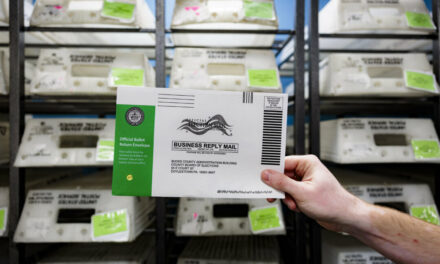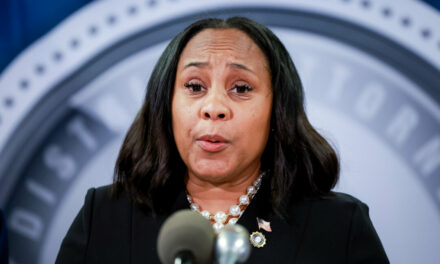We support our Publishers and Content Creators. You can view this story on their website by CLICKING HERE.
Housing, abortion, and illegal immigration were some of the top issues.
New Hampshire’s gubernatorial candidates are making their final pitches to voters with just two weeks to go until Election Day.
At a candidate forum hosted by New Hampshire Public Radio, former Sen. Kelly Ayotte, the Republican nominee, and Manchester’s former Democratic Mayor Joyce Craig squared off on an array of issues, including housing, abortion, and illegal immigration.
Craig, kicking things off, said she was running to help families and communities “being left behind” in a state where Republicans hold the governorship and majorities in both legislative chambers.
“I understand the challenges that our local communities are facing and how the state should be better supporting all of us,” said Craig, who served as Manchester’s mayor from 2018 to 2024.
Yet Ayotte, who spent one term in the Senate from 2011 to 2017, said she felt Gov. Chris Sununu had steered the state in the right direction and that she hoped to continue down that path.
“We’re the No. 1 state for child well-being. We’re the No. 1 state for personal and economic freedom. We have the lowest tax burden in the nation and the lowest poverty rate in the nation,” the former senator said.
“My opponent, Joyce Craig, has a different path that she wants to take us down. She looks to Massachusetts and thinks that’s a better model for New Hampshire, with higher taxes and less freedom. I don’t think that’s the right direction for New Hampshire.”
Housing
Asked about her plan to address New Hampshire’s housing crisis, Craig noted that she allocated more than $30 million to affordable housing during her time as mayor from 2018 to 2024. She also advocated for changing the zoning laws in local communities to remove barriers to building.
“I think it’s really important to note, though, that my opponent is actually benefiting financially from this housing crisis,” Craig charged, pointing to Ayotte’s position on the board of Blackstone, a global investment company.
Referring to Blackstone as the nation’s “largest corporate landlord,” Craig said New Hampshire should adopt price gouging laws so such companies could not “jack up rents and push people out of their homes.”
Moderator Josh Rogers, however, pointed out that both candidates have financial interests in the housing sector, as Craig owns nine apartments and a commercial property.
Ayotte, meanwhile, said her opponent’s claims were “completely absurd,” noting that Blackstone owns very few properties in New Hampshire.
While Ayotte touted her experience at Blackstone and in the Senate as an asset, she added that she would step down from her position at Blackstone if elected governor.
Abortion
On the legality of abortion, Ayotte stressed her view that the issue should be decided by the states rather than the federal government.
“I’ve always supported exceptions for rape, incest, life of the mother in the last three months [of pregnancy]. So if there’s a medical emergency, or if, God forbid, there’s something wrong with the baby, a woman can still obtain an abortion,” she said.
New Hampshire currently prohibits abortion after 24 weeks of pregnancy with exceptions for a fatal fetal anomaly and to save the mother’s life.
Ayotte said she would stand by that law and veto any further restrictions on abortion.
Craig has said she would repeal the current law, which she referred to as a “ban,” and accused Ayotte of flip-flopping on the issue.
In the Senate, Ayotte voted for a federal 20-week abortion limit and supported efforts to defund Planned Parenthood, the nation’s largest abortion provider.
“All of a sudden, her mind changed on this because she knows that this is important to voters in New Hampshire,” Craig contended.
The former mayor added that she felt New Hampshire taxpayers should cover the cost of others’ abortions through Medicaid.
“I believe that abortion is health care, and if a woman needs an abortion, she should have access to that health care no matter if she can afford it or not,” Craig said. “New Hampshire is the only state in New England where Medicaid does not cover abortion, and I think that is something that needs to change.”
Illegal Immigration
As a northern border state, New Hampshire faces its own challenges with illegal immigration.
The issue has been a focal point of Ayotte’s campaign, during which she has repeatedly called for a ban on sanctuary city policies in the Granite State.
Ayotte said that as governor, she would welcome legal immigration while cracking down on policies that encourage illegal immigration.
“We’re going to make sure that we’re not a sanctuary state, that we don’t go the way, frankly, of Massachusetts, that has spent a billion dollars housing illegal immigrants. We have our own housing needs, even for our veterans here,” she said.
Craig said that if she were elected, she would “absolutely not” allow New Hampshire to follow in Massachusetts’s footsteps.
“New Hampshire is not a sanctuary state, and it would not be a sanctuary state when I am governor,” she said.
However, Craig said she did not think taxpayers should pay for the state’s Northern Border Alliance Task Force, an initiative of the current governor to prevent illegal border crossings into the state from Canada.
She said border security is a federal issue.
“I would work with our federal delegation to make sure that we have the funding necessary to get that done,” she said.
By contrast, Ayotte said she supports Sununu’s efforts with the task force but that “we can’t have a state where we have inconsistent policies among communities on sanctuary policies, because that will lead to a sanctuary state.”
“And that’s where Joyce Craig and I disagree,” Ayotte said.

 Conservative
Conservative  Search
Search Trending
Trending Current News
Current News 







